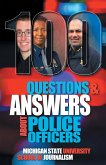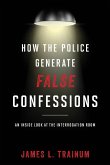- Broschiertes Buch
- Merkliste
- Auf die Merkliste
- Bewerten Bewerten
- Teilen
- Produkt teilen
- Produkterinnerung
- Produkterinnerung
In this era of ever more complex policing issues and the changing nature of policing itself, senior police officers face a never-ending challenge to keep up not only with the latest reforms, but also with the latest research.
Andere Kunden interessierten sich auch für
![Comparing Black Deaths in Custody, Police Brutality, and Social Justice Solutions Comparing Black Deaths in Custody, Police Brutality, and Social Justice Solutions]() Janelle Christine SimmonsComparing Black Deaths in Custody, Police Brutality, and Social Justice Solutions213,99 €
Janelle Christine SimmonsComparing Black Deaths in Custody, Police Brutality, and Social Justice Solutions213,99 €![100 Questions and Answers About Police Officers, Sheriff's Deputies, Public Safety Officers and Tribal Police 100 Questions and Answers About Police Officers, Sheriff's Deputies, Public Safety Officers and Tribal Police]() Michigan State School of Journalism100 Questions and Answers About Police Officers, Sheriff's Deputies, Public Safety Officers and Tribal Police16,99 €
Michigan State School of Journalism100 Questions and Answers About Police Officers, Sheriff's Deputies, Public Safety Officers and Tribal Police16,99 €![How the Police Generate False Confessions How the Police Generate False Confessions]() James L. TrainumHow the Police Generate False Confessions32,99 €
James L. TrainumHow the Police Generate False Confessions32,99 €![Comparing Black Deaths in Custody, Police Brutality, and Social Justice Solutions Comparing Black Deaths in Custody, Police Brutality, and Social Justice Solutions]() Janelle Christine SimmonsComparing Black Deaths in Custody, Police Brutality, and Social Justice Solutions165,99 €
Janelle Christine SimmonsComparing Black Deaths in Custody, Police Brutality, and Social Justice Solutions165,99 €![Leadership and personal development Leadership and personal development]() Samy NtumbaLeadership and personal development29,99 €
Samy NtumbaLeadership and personal development29,99 €![Policing in Hong Kong Policing in Hong Kong]() Kam C. WongPolicing in Hong Kong71,99 €
Kam C. WongPolicing in Hong Kong71,99 €![Effective Leadership and Communication Model Effective Leadership and Communication Model]() ZAKI AMOS ADUKSONEffective Leadership and Communication Model31,99 €
ZAKI AMOS ADUKSONEffective Leadership and Communication Model31,99 €-
-
-
In this era of ever more complex policing issues and the changing nature of policing itself, senior police officers face a never-ending challenge to keep up not only with the latest reforms, but also with the latest research.
Hinweis: Dieser Artikel kann nur an eine deutsche Lieferadresse ausgeliefert werden.
Hinweis: Dieser Artikel kann nur an eine deutsche Lieferadresse ausgeliefert werden.
Produktdetails
- Produktdetails
- Verlag: OUP UK
- Seitenzahl: 318
- Erscheinungstermin: 1. Oktober 2015
- Englisch
- Abmessung: 234mm x 156mm x 17mm
- Gewicht: 485g
- ISBN-13: 9780198728627
- ISBN-10: 019872862X
- Artikelnr.: 42967689
- Herstellerkennzeichnung
- Libri GmbH
- Europaallee 1
- 36244 Bad Hersfeld
- gpsr@libri.de
- Verlag: OUP UK
- Seitenzahl: 318
- Erscheinungstermin: 1. Oktober 2015
- Englisch
- Abmessung: 234mm x 156mm x 17mm
- Gewicht: 485g
- ISBN-13: 9780198728627
- ISBN-10: 019872862X
- Artikelnr.: 42967689
- Herstellerkennzeichnung
- Libri GmbH
- Europaallee 1
- 36244 Bad Hersfeld
- gpsr@libri.de
Professor Jenny Fleming joined the University of Southampton as Professor of Criminology in 2012 where she is also the Director of the Institute of Criminal Justice Research. Professor Fleming's expertise lies in collaborative research covering such topics as police partnerships, police leadership and management. She is interested in organizational imperatives that impact on the way in which 'police do business' and has published widely in this area. She is the co-author of Fighting Crime Together: The Challenges of Policing and Security Networks (with Jennifer Wood) and The Sage Dictionary of Policing (with Alison Wakefield). Professor Fleming is the Editor-in-Chief of Policing and Society, an international journal of research and policy, the leading policing peer-reviewed journal in the UK. Professor Fleming is part of the University Consortium in partnership with the College of Policing, supporting a programme for the newly established What Works Centre for Crime Reduction.
* 1: Jenny Fleming: Experience and Evidence: The Learning of Leadership
* 2: Timothy Brain and Lynne Owens: Leading in Austerity
* 3: Robert Reiner and Denis O'Connor: Politics and Policing: The
Terrible Twins
* 4: Adam Crawford and Mike Cunningham: Working in Partnership: The
Challenges of Working across Organizational Boundaries, Cultures, and
Practices
* 5: Keith Grint and Sara Thornton: Leadership, Management, and Command
in the Police
* 6: Allyson MacVean and Peter Spindler: Principled and Ethical
Policing: Some Considerations for Police Leaders
* 7: John GD Grieve and Robin Bhairam: 'Say it Loud Without a Frown;
Good Investigators Write it Down': Theories of Leading Ethical
Investigations
* 8: Martin Innes, Sarah Tucker, and Matt Jukes: When Should They Get
Engaged? Police-Community Engagement
* 9: Aogán Mulcahy and Hugh Orde: Police Leadership in Fractured
Societies
* 10: Marisa Silvestri and Colette Paul: Women in Police Leadership
* 11: Mark Kilgallon, Martin Wright, and Adrian Lee: Contested
Knowledge: Learning to Lead in a Policing Context
* 12: Jenny Fleming, Nick Fyfe, and Alex Marshall: Making Connections
between Research and Practice: Tackling the Paradox of Policing
Research
* 13: Nic Beech, Elizabeth Gulledge, and David Stewart: Change
Leadership: The Application of Alternative Models in Structural
Policing Changes
* 2: Timothy Brain and Lynne Owens: Leading in Austerity
* 3: Robert Reiner and Denis O'Connor: Politics and Policing: The
Terrible Twins
* 4: Adam Crawford and Mike Cunningham: Working in Partnership: The
Challenges of Working across Organizational Boundaries, Cultures, and
Practices
* 5: Keith Grint and Sara Thornton: Leadership, Management, and Command
in the Police
* 6: Allyson MacVean and Peter Spindler: Principled and Ethical
Policing: Some Considerations for Police Leaders
* 7: John GD Grieve and Robin Bhairam: 'Say it Loud Without a Frown;
Good Investigators Write it Down': Theories of Leading Ethical
Investigations
* 8: Martin Innes, Sarah Tucker, and Matt Jukes: When Should They Get
Engaged? Police-Community Engagement
* 9: Aogán Mulcahy and Hugh Orde: Police Leadership in Fractured
Societies
* 10: Marisa Silvestri and Colette Paul: Women in Police Leadership
* 11: Mark Kilgallon, Martin Wright, and Adrian Lee: Contested
Knowledge: Learning to Lead in a Policing Context
* 12: Jenny Fleming, Nick Fyfe, and Alex Marshall: Making Connections
between Research and Practice: Tackling the Paradox of Policing
Research
* 13: Nic Beech, Elizabeth Gulledge, and David Stewart: Change
Leadership: The Application of Alternative Models in Structural
Policing Changes
* 1: Jenny Fleming: Experience and Evidence: The Learning of Leadership
* 2: Timothy Brain and Lynne Owens: Leading in Austerity
* 3: Robert Reiner and Denis O'Connor: Politics and Policing: The
Terrible Twins
* 4: Adam Crawford and Mike Cunningham: Working in Partnership: The
Challenges of Working across Organizational Boundaries, Cultures, and
Practices
* 5: Keith Grint and Sara Thornton: Leadership, Management, and Command
in the Police
* 6: Allyson MacVean and Peter Spindler: Principled and Ethical
Policing: Some Considerations for Police Leaders
* 7: John GD Grieve and Robin Bhairam: 'Say it Loud Without a Frown;
Good Investigators Write it Down': Theories of Leading Ethical
Investigations
* 8: Martin Innes, Sarah Tucker, and Matt Jukes: When Should They Get
Engaged? Police-Community Engagement
* 9: Aogán Mulcahy and Hugh Orde: Police Leadership in Fractured
Societies
* 10: Marisa Silvestri and Colette Paul: Women in Police Leadership
* 11: Mark Kilgallon, Martin Wright, and Adrian Lee: Contested
Knowledge: Learning to Lead in a Policing Context
* 12: Jenny Fleming, Nick Fyfe, and Alex Marshall: Making Connections
between Research and Practice: Tackling the Paradox of Policing
Research
* 13: Nic Beech, Elizabeth Gulledge, and David Stewart: Change
Leadership: The Application of Alternative Models in Structural
Policing Changes
* 2: Timothy Brain and Lynne Owens: Leading in Austerity
* 3: Robert Reiner and Denis O'Connor: Politics and Policing: The
Terrible Twins
* 4: Adam Crawford and Mike Cunningham: Working in Partnership: The
Challenges of Working across Organizational Boundaries, Cultures, and
Practices
* 5: Keith Grint and Sara Thornton: Leadership, Management, and Command
in the Police
* 6: Allyson MacVean and Peter Spindler: Principled and Ethical
Policing: Some Considerations for Police Leaders
* 7: John GD Grieve and Robin Bhairam: 'Say it Loud Without a Frown;
Good Investigators Write it Down': Theories of Leading Ethical
Investigations
* 8: Martin Innes, Sarah Tucker, and Matt Jukes: When Should They Get
Engaged? Police-Community Engagement
* 9: Aogán Mulcahy and Hugh Orde: Police Leadership in Fractured
Societies
* 10: Marisa Silvestri and Colette Paul: Women in Police Leadership
* 11: Mark Kilgallon, Martin Wright, and Adrian Lee: Contested
Knowledge: Learning to Lead in a Policing Context
* 12: Jenny Fleming, Nick Fyfe, and Alex Marshall: Making Connections
between Research and Practice: Tackling the Paradox of Policing
Research
* 13: Nic Beech, Elizabeth Gulledge, and David Stewart: Change
Leadership: The Application of Alternative Models in Structural
Policing Changes








